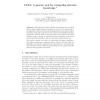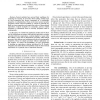95 search results - page 6 / 19 » Simulation based security in the applied pi calculus |
JLP
2008
13 years 8 months ago
2008
In the analysis of security protocols, methods and tools for reasoning about protocol behaviors have been quite effective. We aim to expand the scope of those methods and tools. W...
RTA
2009
Springer
14 years 3 months ago
2009
Springer
Reasoning about the knowledge of an attacker is a necessary step in many formal analyses of security protocols. In the framework of the applied pi calculus, as in similar languages...
TGC
2007
Springer
14 years 2 months ago
2007
Springer
In computing systems, trust is an expectation on the dynamic behavior of an agent; static analysis is a collection of techniques for establishing static bounds on the dynamic behav...
LOPSTR
2001
Springer
14 years 1 months ago
2001
Springer
In this paper we define a sequent calculus to formally specify, simulate, debug and verify security protocols. In our sequents we distinguish between the current knowledge of prin...
CSFW
2009
IEEE
14 years 3 months ago
2009
IEEE
—Formal methods have proved their usefulness for analyzing the security of protocols. Most existing results focus on trace properties like secrecy (expressed as a reachability pr...


